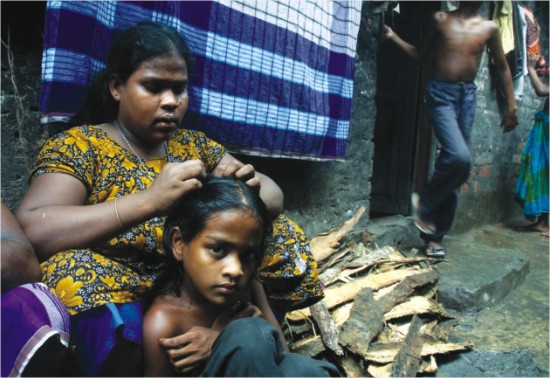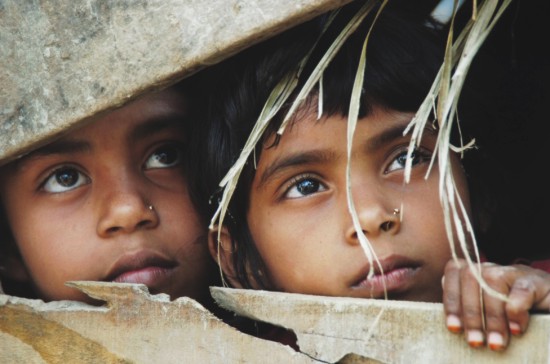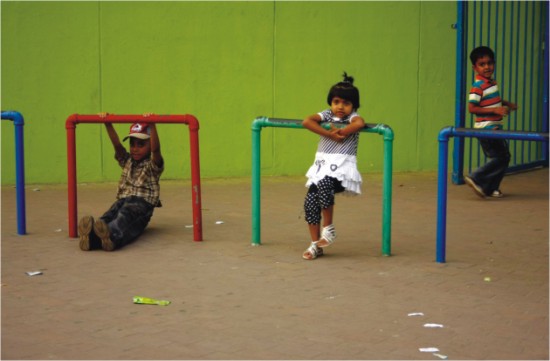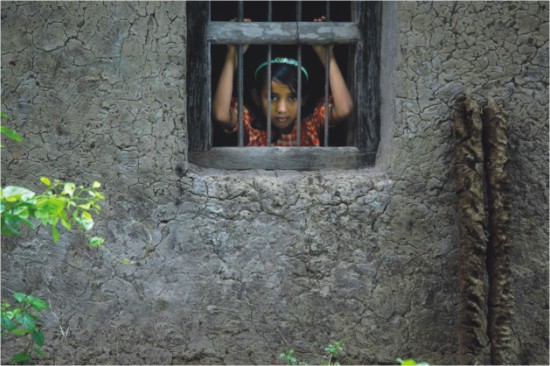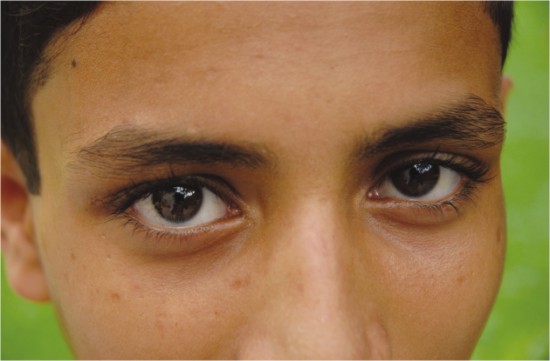
Inside
|
The Unbearable Heaviness of Being a Child Farah Mehreen Ahmad lifts the lid off the child molestation taboo. When I lifted the most adorable two-year old in the world to sit her on my lap, she started screaming "Amar lengtu! Amar lengtu!" with an angry and disturbed look on her face. I didn't realise I had accidentally pulled her dress upto her waist. Perplexed and alarmed by her premature recognition of her "shame" zone that would in a few years evolve into her "fear" zone, I worried about what grounds her intuition was building up on. As I fixed her dress, she lightly slapped my arm to "punish" me for revealing her shame. She seems to be perfectly fine with bare arms and legs. I was as disheartened as I was resentful to see how aware she is of the hierarchy of fear/shame attached to different parts of her body. Why has it arrived so soon -- her terrorised conscious? Her five year old sister wanted to show off how her little sister is able to identify different parts of her body. She pointed at the corner of her eye, "Eta amar chokh." Then she took over. "Eije amar naak! Eita amar kopaal …Eita amar gaal." Extending her arms she said, "Egula amar haath." Then she lifted her frock, and said, "Eita amar pet … aar eije amar dudu…" Right then, a male staff of the house walked into the room to get something. Before I knew it, I quickly pulled down her dress, pulled her close, and asked her to tell me that story about two girls and their tea-drinking cockroach friend that she had made up a few days back. "Ekta telapoka aar duita meye boshe acche…" Why did it creep up on me without any warning -- my terrified conscience? This Ramadan, a bunch of friends and I went go to Dhanshiri for post-iftaar tea quite frequently. There we befriended a group of kids -- approximately 10 years old, who live in Korail, but hover in the area "collecting" money after school everyday. As soon as we got there, they would come shake our hands, sing for us, ask us to sing, tell us about their lives, inquire about ours … you get the picture. Interacting with children is always refreshingly cathartic until that one jolting moment, when a manufactured adult befalls their persona like it did when this one little girl, out of the blue, told my friend Afrina that her black scarf which she had carefully wrapped over her t-shirt, was too thin. She then pointed at my cotton orna dangling from my right shoulder and approvingly used that as an example to demonstrate what kind of fabrics she should be looking out for. She proceeded to grab a side of my scarf and pulled it to cover my chest "properly," and then pointed at Afrina, who she was dissatisfied with just a few moments ago, to illustrate how I should be wearing my scarf. Afrina and I were exchanging surprised and awkward glances when another kid, with her scarf over her head, pulled mine and lightly jumped in an attempt to place my scarf over my head. Simultaneously, she reminded us of the decorum inscribed in the invisible tor of being "Bangali" and 'Musolmaan.' "Mone rakhben Apu, amra hoilam…" I turned to Afrina and said "this is so weird! These are kids!" "Yeah," she responded, "makes you wonder who has been teaching them this stuff." Their parents? Relatives? Neighbours? Friends? Teachers? That man who kept on interrupting our conversation by trying to hand us a flyer with some religious "baarta" and asking for donation for a madrasa? No, that's too convenient a coincidence. Maybe it's no one in particular, but everyone in general that they imbibed this from. I don't know… Trying to divert the conversation, I told her I wish I too had played in the rain seeing that she was wet, while all her companions were dry. She said she didn't play in the rain. "Then why are you wet?" "Oi betaye paani maarse amar gayer upor," she pointed at one of the shop-keepers at a slight distance. There were quite a number of them, so I don't know exactly which one she pointed at.
Generally distrustful of adults around kids, and feeling queasy about the picture of an adult splashing water at a child, I immediately started correlating why she felt it important to advice me and my friend to take shopping and wrapping advice from each other, and her super-conscious realisation of being "Bangali" and 'Musolmaan' with her need to protect herself from her seemingly predatory surrounding. What has this identity done for her apart from fraternising her with a remote, unyielding and superficially homogenous community? Does she already know that if the water had made her clothes translucent, fingers raised would have pointed towards her? Is that why she tries to ensure that there are no "loopholes" in her presentation of herself? Am I giving her too much credit? Probably not. Her fear/con-sciousness is probably not based on intuition solely, but also knowledge and God forbid, experience. If 1 out of 3 children in Bangladesh is a victim of sexual abuse, then children everywhere streets, shacks, houses and mansions -- better forego thoughts of unicorns and kittens playing on a rainbow made by a Fairy Godmother, and buckle up. I feel chills down my spine every time I remember the story of that one girl who was molested by her mama (maternal uncle) as a child, and had known it to be the only form of sexual interaction. So much so that she went through a series of boyfriends, all of whom she addressed as "mama," and after the first physical contact, dumped them. I feel my skin spike up like thorns when I think of that boy who would be raped by his uncle everyday that he took his herd to graze. I feel my gut tie up in knots when I think of that 7 year old girl regularly raped by her uncle for a year. I want to choke that female relative of hers who blamed her maturity and 'exposure to the world' as props used to provoke the poor, helpless, grown man. I feel my blood boil when I recall the story of that boy who would breakdown everytime his parents coaxed him into studying with his (male) home tutor. Later they discovered the child was subjected to groping on a regular basis and was threatened into keeping mum. I feel I might pop a vein everytime I remember the little girl who had the same experience with her teacher. Sexual abuse of children is a harsh reality which is more common that realised. It comes in varying degrees of every form physical, emotional, verbal and visual. Some surveys say at least 1 out of 5 adult women and 1 out of 10 adult men report having been sexually abused in their childhood. BSAF studies reveal that though there is no safe age for boys and girls, vulnerability tends to be at its peak between10-15. The long-term emotional and psychological damage caused by sexual abuse can be devastating to a child. No child is conditioned to cope with sexual stimulation. Even an infant with no concept or awareness of sexuality or sexual development, will develop problems resulting from the inability to cope with the over-stimulation. Mullen and colleagues (1996) found that women with histories of sexual abuse as children, have had over five times the rate of physical abuse, and were three times less likely to also report emotional deprivation. There tends to be a considerable overlap between physical, emotional and sexual abuse, and children who are subjected to one form of abuse are significantly more likely to suffer other forms of abuse (Briere and Runtz 1990; Bifulco et al. 1991; Mullen et al. 1996; Fergusson et al. 1997; Fleming et al. 1997). Then there are children who are more often than not subjected to one or all three forms of abuse. I would like to focus a bit on the situation of child domestic workers since they tend to be more marginalised than other children, even other working children, as a result of being confined within household premises with no or extremely limited mobility. Since there is no formal jurisdiction to protect working children from abuse, child workers, particularly child domestic workers lead lives of shadow citizens. There is of course no acknowledgement of their role as economic actors or their role in harnessing domestic discipline. Their parents are often not aware of where they are working or under what conditions. Generally informal verbal agreements are reached between the employers and the guardian responsible for linking up the child. In a lot of cases these agreements are ignored, and there is no institutional accountability measure for them to fall back on. A lot of domestic employments occur via intermediaries relatives, acquaintances, "bua suppliers," etc. This further dissolves the already bleak transparency regarding the children's conditions. Almost every family of lower middle class and up has domestic help, and the number reaches about 2 million approximately. Statistics published by Unicef in May 1999 showed that 45% of the children working as domestic help did not receive wages. There are frequent reports of abuse towards child servants. Remember Ratna? The 15 year old brutally tortured by the wife of the Chief Judicial Magistrate of Sylhet? She was kept under lock and key and tormented. Despite there being visible marks of persecution on her chest, back, thigh and tongue, the police refused to file her case. What happens when the umpire goes to bed with the batsman? This happens. Remember the 9 year old Tanjina Akter tortured by a doctor's wife, daughter and two sons? The one who was regularly caned and harder if she cried? Ratna and Tanjina are 2 out of hundreds of similar stories. James Melik and Duncan Bartlett reported on One World South Asia that in Bangladesh, over 300 deaths of child domestic workers were reported between 2001 and 2008. Though not termed so, these shadow citizens are in a manner of speaking, child soldiers -- churning the economic wheel, greasing the societal pedal, fending for themselves and their families, sacrificing their rights and their lives before they even get a chance to conceive or embrace them. And there is an army of them. ILO estimates that of 218 million working children around the world, 7.4 million (BBS, UNICEF and DSS Baseline Survey) Bangladeshi children are economically active between the ages of 5-17 years. Out of them 400,000 are child domestic workers (CDW) in Dhaka alone, and are between the ages of 6-17 years. Another survey found that 38% of them are 11-13 years of age and 25% are 5-10 years of age. In 2004, the Financial Express found that out of 1181 child workers in Maghbazar alone, 770 were domestic workers. Sexual abuse of CDW is extremely prevalent. In Bangladesh, over 25% of CDW report that they have been raped. Breaking the Silence (BtS) reported the case of 10 year old Mukta who worked as household help in an urban area. One day she left her tasks undone and ran home to her mother. Her mother's effort to explain the risks of living in a slum seemed to fall flat on its face. Eventually, she revealed that her private parts were frequently touched by the old man of the house. Her mother dismissed the allegation on grounds that such behaviour was sinful, and therefore could not be happening. She apologised to Mukta's employers and returned her. She didn't mention Muktas complaint to them, but requested them to not send her out to shops. The extent of abuse aggravated and became more unbearable over the next couple of weeks. Mukta`s mother contacted BTS who were preparing to bring her back. However, shortly after, the mother reported that the employers had reprimanded her for her daughter's absconding. Despite wanting to, the mother did not tell them why Mukta was so desperate to leave since her husband earned a good salary as a guard at their house. Their desperation for economic security made her send Mukta back to that house. Ratna Yasmin reports on Ayesha. This 15 year old girl would be raped by the man of the house whenever the wife was away. When she got pregnant, as expected, her character was slandered and she was thrown out of the house. She sought refuge in her relative's house in Kamrangirchar and eventually gave birth to her daughter. When she returned to the Mohakhali house where she used to work to demand her and her daughter's rights, she was brutally tortured by the family. Studies show that both male and female CDW are subject to frequent sexual abuse. Generally in these cases, boys tend to be more marginalised than girls as a result of gender stereotyping, social denial, underestimation of sexual victimisation of males, and the relative inadequacy of research on sexual abuse of boys. I remember asking a group of women in Bauniabadh if they thought boys were vulnerable to sexual abuse at all. After a minute's silence one of them said, "Chhele manushder korleo, kototukui ba korbo?" It's all about visible-tangible eventualities. That's why when asked if women can be perpetrators, I got the same answer, "Mohilarao omon hoito pare, kintu mohila toh, korleo kotutuki ba korbo?"
Sometimes I wonder if children are viewed as people. I see them treated as angels, toys, monkeys, entertainers, assets, liabilities … all out of affection of course (except the liabilities part), but I rarely see them treated as people. Above every child's halo dangles a tong that would pick it up and throw it out the second the child exhibits anything "unchildly." Yes it's true that perpetrators of sexual abuse attribute educational value, sexual pleasure and even provocation to their actions. Yes it's true that they subtly or aggressively threaten the child into remaining silent. But let's not forget to acknowledge where we falter. Can a child's silence be entirely attributed to the threat of the abusers? Have we not set-up an inarticulate, but deep-seeded decorum on how to behave as a child? Are there no unsaid rules about what a child is allowed to know, think or talk about? Even the most "haba-goba" child can intrinsically identify "adult" content, and will refrain from talking about it. They know that the repercussion of certain articulations will earn them the infamous "ichre-paaka," "mitthuk," "spoilt," and "noshto" titles, and possibly bear corporal repercussions. So are we not partially responsible for the silence by denying them a platform where they will be heard, trusted and dignified; by putting so much romantic weight on “innocence,” that being a child becomes a burden? If we can't protect the child from impure adult infiltrations, why try to prevent them from acknowledging and articulating them? Is it the uncanny suicidal knack for denial that makes us do this or a conscious pretence of perfection? Who is the audience? Are we all Daphne du Maurier's Rebecca? Think about the child domestic workers. It's as if they have avatars. They are bearers of double-gaggers these doppelgangers; shoulderers of many burdens of innocence, of all-encompassing deprivation, and of obligation ("amra toke ja dei tor baap dite parto?"). They also bear the burden of bitter colonial brine smothered all over them. The ruthless treatment of child domestic workers mirrors the irrational power-trip of colonisers. It seems these legal slaves are pawns in the quest for vendetta against an almost-forgotten offender, but a resented and lamented, yet (on a certain level) sadomasochism-friendly offence; dormant punching bags for exhaling inner doormat frustrations.
We have warped illusions of loyalty. If a domestic worker wants to switch houses for a higher salary, their loyalty is questioned, though it is perfectly alright for someone with a "proper job" to switch between organisations for more lucrative incentives. Not that we needed further proof of domestic work being in the grey zone between employment and new age slavery, but here it is. And if there is a trace of any kind of "disloyalty" in a child worker, then lo and behold! Not only has s/he betrayed the owner/ employer, but also the sanctity of being a child the obligation of not having agency. The treatment of child domestic workers reminds me of the only lesson I retained from my 8th grade Bangladesh studies class. We were taught the concept of "maatshonnay" a metaphor explaining feudalistic mistreatment of subjects and how the assertion of power of the higher echelon swallowed that of the lower the way a big fish swallows a smaller one. This is probably where our obsession with "kochi" (tender) is rooted kochi daab, kochi shosha, kochi bou, kochi shishu. When asked what kind of a girl she was looking to employ, the lady asked for one within 10-12 years of age. Placing her hand about 3 feet off the ground she said, "shundor size." The rational behind this is parallel to the rational behind propagation of early marriage for girls -- "naile poray adjustment problem hoy … manaye cholte parena." Yes, I understand. The more "kochi" they are the more modest they will be; and modesty here is systematically equated with subservience. The more "tender" they are, the more conducive they would be to "shokto haathe domon” measures; the more susceptible they are to succumb to a manufactured reality born out of historical suppression leading to aggressive or repressive behaviour (e.g. most physical abusers of CDW are female, though sexual abusers are of both sexes), vertically founded upon suffocating propriety, stringent social decorum, persistent practice of denial and a lively game of guilt-torch relay.
"Egula toh oder deshe hoy," is something you have probably heard almost every time something taboo, especially if sexual in nature is brought up. The establishment of a dogmatic culture of silence is generally justified by an "us vs. them" disposition. It is common and convenient thinking that all things sexual (deviant and otherwise) are a Western phenomena, Then you bring up real life deshi examples and the jealousy and conspiracy theories begin to flow. You press a little harder. You bring it closer to home, and then comes the full-throttle west bashing. "Tomra bidesh giye and TV dekhe eshob shikhso. Nijer deshke kokhono chhoto korbana. Amader ki history!" We have given our lives for our language, we have fought for our land twice! “Aar ora khali rights rights kore! Oder ki aar emon acche? Khali jeans, beer aar burger!” Then proceed to gush over our clothes and food and culture Yes culture, it's a beautiful thing. It provides diversity, identity, unity and security. But it becomes the justification for pushing people (particularly girls) into blind marriages. It sent Humayra Abedin to a mental institution for no clinical reason. It justifies domestic violence, that springboards coercion of the weaker. It made that 16 year old girl marry her rapist. It gave that influential father the license to throw his daughter's boyfriend in jail for no reason so he can get her married to the boy of his choice. It made it alright for the mistress of the house to deprive the child worker of a meal. It allowed the father to stop his son from studying astronomy so he can become an accountant. Who needs to find the Holy Grail when you have found culture? Therefore, it's also a bipolar thing that contradicts and counter balances its pretty counterparts by forcing homogeneity; by undermining diversity, but catalysing dispersion and disconnect by upholding feudalistic hierarchy; through identity-jacking via value imposition and infringement; and lastly, but most horrifyingly, by causing insecurity by instilling a fear of losing culture and thereby the security it allegedly provides.
"Uff! Eto dhoro keno?" I'm sorry, but I'll take a culture of bacteria over a culture of phantom barbed wire around my throat, pisciculture over P.C. culture, any day. If you pitch Tagore's western prize for his eastern book as compensation for Mukta's abuse; if you sing "khelicche jolodebi” to overshadow Ratna's screams, you could not have found a hasher way of disrespecting the artists. So, it's not my desh or my culture I am belittling, it's some deshis and their culture that I am stabbing. My intention is not to highlight where others are better off, but to emphasise what we need to work on. This is not a "whose mobile is more expensive?" competition. The tragedy behind the struggle to preserve and respect culture while using it as a shield is that, the harder you press it on, the more likely the receiver is to distance him/herself. If kids today seem to have sold out to “their culture,” a huge part of the reason might be shackles placed around their ankles in the name of culture and demand for blind acceptance and obedience in the name of respect. That's when B-Grade Hallmark Channel teenage heroes/heroines with their juvenile revolts, teenage pregnancies and erratic driving, the One Tree Hill kids, the OC characters, etc. begin to look more liberated. Chuck Norris and Ali G are not the enemies stealing your child's culture. The kid loses his/her culture one gag at a time. Gross and indiscrete rejection of western or universal values has become a convenient scapegoat for harnessing predatory abusiveness.
"Meyeta khub bod, barir shaheber shathe shuito. Chhoto hoile ki hobe? Ajkalkar gorib manush aar ager moton shorol nai. Tandor shob." Hmm the girl "shuito" with the shaheb, but didn't the shaheb "shuito" with the girl? "Bhabi, ei boyoshe nanan dhoroner fantasy hoy." "Ei class a ei dhoroner fantasty amader niye beshi. "Ei class khub chalak … eshob bole fashaite chaye … dhurondhor! Kichhuina shudhu taka chaye!" Yes dear, blame the hormones, not the hubby. Yes, it's your family lineage and bank balance that was so irresistible to the 10 year old. Yes, the 12 year old provoked the 55 year old to make sexual advances. Ah! The conclusions of the suspicionist class! Why do a people with a history and concurrent reality of oppression and violence find it so difficult to believe that victims can be just victims without being instigators? Farah Mehreen Ahmad works for Brac and is also a member of Drishtipat Writers' Collective.
|
